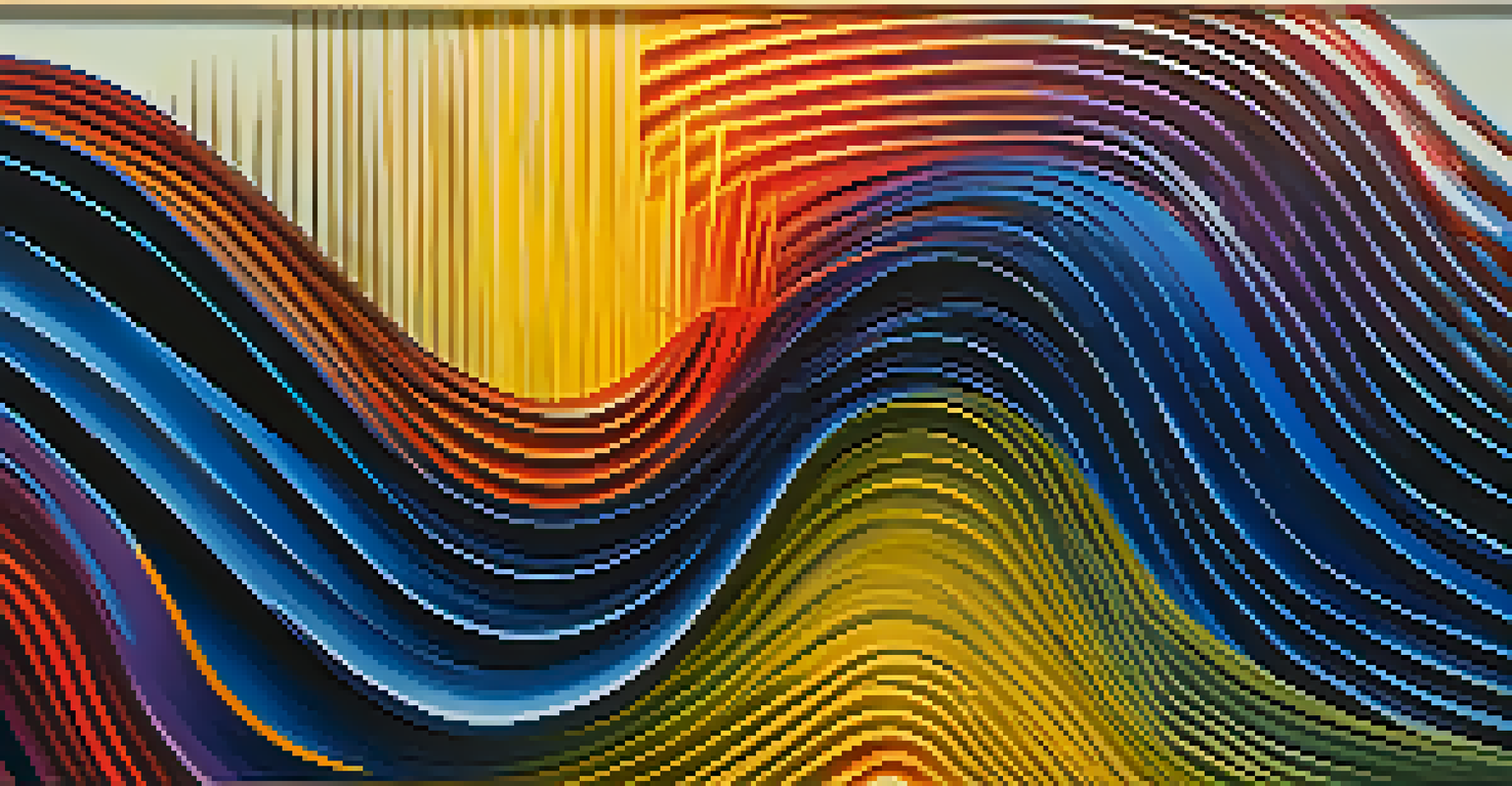The Science Behind Music and Psychedelic Experiences

Understanding Psychedelics and Their Effects on the Brain
Psychedelics are substances that alter perception, mood, and cognitive processes. They interact with serotonin receptors in the brain, particularly the 5-HT2A receptor, leading to profound changes in consciousness. This can result in visual distortions, emotional shifts, and a sense of interconnectedness, making the experience deeply introspective.
Music can change the world because it can change people.
When consumed, psychedelics can lead to a state of heightened awareness and a unique perception of reality. For instance, users often report a feeling of euphoria and an enhanced appreciation for music. This heightened sensitivity can make music more than just sound; it becomes a profound experience that resonates at an emotional level.
Research shows that these substances can also facilitate emotional healing by enabling users to confront difficult feelings. They can evoke memories and insights, often accompanied by music, which acts as a powerful catalyst for exploration and understanding during these psychedelic journeys.
The Role of Music in Altered States of Consciousness
Music has a unique ability to evoke emotions and influence our mental states. In the context of psychedelics, it can serve as a guide, helping individuals navigate their experiences. It’s often said that music can set the tone for a trip, creating an atmosphere that can either enhance or diminish the experience.

Many users find that certain types of music resonate deeply during their psychedelic experiences. For example, ambient or instrumental music is frequently chosen for its calming effects, while more rhythmic genres can energize or elevate the experience. The choice of music can shape the emotional landscape of the trip, making it a critical component.
Psychedelics Alter Perception Deeply
Psychedelics interact with serotonin receptors, resulting in profound changes in consciousness and emotional experiences.
Furthermore, music can trigger memories or feelings that may be otherwise inaccessible. This connection can lead to cathartic releases or profound realizations, turning a psychedelic experience into an opportunity for personal growth and healing.
Neuroscience: How Music and Psychedelics Interact
Neuroscience provides insights into how music enhances psychedelic experiences. When listening to music during a trip, various brain regions become activated, including those associated with emotion, memory, and pleasure. This creates a rich tapestry of sensory experiences that can profoundly affect the user’s state of mind.
Psychedelics can help you confront your deepest fears, and music can provide the comfort you need to do so.
Studies using brain imaging techniques have shown that both music and psychedelics can alter brain connectivity patterns. They can lead to a breakdown of the usual boundaries between different brain networks, allowing for a more fluid and interconnected experience. This phenomenon could explain why music feels so powerful during these altered states.
Additionally, the combination of music and psychedelics can amplify emotional responses. As users experience heightened feelings of joy, sadness, or nostalgia, the music can deepen these emotions, creating a more immersive and transformative experience.
Historical Perspectives: Music and Psychedelic Practices
Throughout history, various cultures have recognized the powerful connection between music and altered states of consciousness. Indigenous rituals often include music as a core component, using it to enhance spiritual journeys and healing ceremonies. This tradition highlights the universal understanding of music’s ability to transcend ordinary experiences.
For example, in many shamanic practices, music is used to facilitate communication with the spirit world. Drumming, chanting, and singing create a rhythm that guides participants through their experiences, emphasizing the role of sound in spiritual exploration. This practice underscores the idea that music can be a bridge to deeper understanding and connection.
Music Enhances Psychedelic Journeys
Music plays a crucial role in shaping the emotional landscape of psychedelic experiences, often guiding users through their journeys.
In modern contexts, the resurgence of interest in psychedelics has seen music festivals and therapeutic sessions where music plays a pivotal role. This blend of ancient practices with contemporary understanding illustrates the timeless bond between music and the psychedelic experience.
The Therapeutic Use of Music in Psychedelic Therapy
Recent studies have shown promising results for using music in conjunction with psychedelics for therapeutic purposes. In clinical settings, therapists often curate playlists tailored to the experience, guiding patients through their emotional journeys. This approach helps create a safe space for exploration and healing.
Music can provide a comforting backdrop during challenging moments, facilitating emotional release and processing. For instance, during sessions with substances like psilocybin or MDMA, patients often report that music helps them access and navigate difficult emotions, leading to breakthroughs and insights.
Moreover, the therapeutic use of music can enhance the integration of psychedelic experiences. By reflecting on the emotions and insights gained during a session, individuals can better understand and apply these lessons to their everyday lives, fostering long-term healing and personal growth.
The Emotional Power of Music During Psychedelic Trips
One of the most fascinating aspects of music during psychedelic experiences is its emotional power. Many users describe music as a companion during their journeys, capable of eliciting profound feelings of joy, sadness, or nostalgia. This emotional connection often leads to a deeper understanding of oneself and one's experiences.
For example, a familiar song might trigger a memory that evokes a strong emotional response, leading to catharsis or realization. This phenomenon can empower individuals to confront their feelings, making music a valuable tool for emotional processing during trips. It’s as if the music acts as a mirror, reflecting the inner landscape of the mind.
Therapeutic Music Aids Emotional Healing
In therapeutic settings, curated music can facilitate emotional exploration and integration during psychedelic therapy sessions.
Additionally, the emotional intensity of music can create a sense of unity and connection among participants in group settings. Sharing a musical experience while on psychedelics can foster bonds and enhance the feeling of togetherness, highlighting music's role in building community and shared understanding.
Crafting the Perfect Playlist for Psychedelic Experiences
Creating a playlist for a psychedelic experience is an art form in itself. It requires an understanding of how different types of music can influence emotions and perceptions. A well-curated playlist can enhance the journey, guiding the listener through various emotional landscapes.
Typically, a playlist might start with softer, ambient tracks to ease the listener into the experience. As the trip progresses, more dynamic or uplifting music can be introduced to elevate the mood. Finally, bringing in calming or introspective pieces towards the end can help ground the experience as it winds down.

Ultimately, the goal is to create a sonic journey that mirrors the emotional ebb and flow of the psychedelic experience. Personal preferences play a significant role, as familiar songs can evoke strong feelings and memories, making the experience more meaningful and transformative.